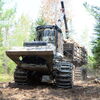Processing Your Payment
Please do not leave this page until complete. This can take a few moments.
Maine's newest paper maker, Cate Street Capital, says it's committed ‘for the long term'
Cate Street Capital, the new owner of paper mills in Millinocket and East Millinocket, never intended to enter the paper-making business.
When Gov. Paul LePage's office approached the Portsmouth-based company last summer about purchasing the mills — both of which had been closed by their previous owner, Toronto-based Brookfield Asset Management — the inquiry wasn't greeted with enthusiasm. "Initially, to be honest with you, the paper business was nothing we were interested in," says Richard Cyr, Cate Street's senior vice president.
But the company, which focuses on "new, green, sustainable technology," according to Cyr, took a look at the mills anyway. He was encouraged by what he saw. For two years, Cate Street had been looking for a home for another of its businesses, Thermogen Industries, to produce torrefied wood, a pellet-type fuel that industrial customers can use in lieu of or in combination with coal. "All the things that were up in the Millinocket/East Millinocket area, from the infrastructure to the wood basket to the employees — all of it was in sync with what the Thermogen business was all about," says Cyr. "All of the stuff that had to do with the paper business actually was the same for what we needed for Thermogen."
Recognizing the potential synergies that could be leveraged if Cate Street could get the paper mills up and running, it took a closer look at the mills, the paper-making business and market demand. Cyr even traveled to Europe to line up potential new customers for the newsprint produced in the East Millinocket mill. Cate Street looked for places it could bring efficiencies to paper making, and for ways to avoid the pitfalls previous owners had fallen into. "If you learn anything about Cate Street, it's that they want to build a better mousetrap," says Scott Tranchemontagne, the company's spokesperson.
Confident that it could make the economics work, Cate Street in September purchased both mills for an undisclosed price from Brookfield. The contracts Cyr inked in Europe allowed the company to quickly rehire nearly 225 employees to reopen the East Millinocket mill, which Brookfield had idled since last April, putting roughly 450 people out of work. The first shipment rolled off the production line in November. For now, the Millinocket mill, which Brookfield closed in September 2008 and had produced supercalendered paper for magazines, catalogs and newspaper inserts, remains shuttered. The company will reopen it only if it makes economic sense, Cyr says. Meanwhile, Thermogen Industries in December announced plans to begin building torrefied wood machines this year on site in Millinocket, a renewable energy project that could create 100 jobs for the area.
The obvious question Cate Street faces is why it thinks it will succeed with the mills where several other companies have failed. "We're certainly keenly aware of the pitfalls of the past with people who have tried to run that paper mill and we believe we've learned from the mistakes of others," Cyr says. "We're approaching it in a very different way."
A green arena beginning
Cate Street Capital was founded three years ago with a mission to invest in technologies that are green, sustainable and scalable, Cyr says. In that time, the company has grown from four to 52 employees and taken on a number of projects, Cyr says. In October, it began construction on a 75 MW biomass plant in Berlin, N.H., at the site of the former Fraser Papers pulp mill. In October 2010, it opened the Red Desert Water Reclamation Center in Wyoming to treat water from nearby oil and gas-drilling operations.
"The company's mission is to really be in this green, sustainable arena and bring this new technology to commercial operation quickly, but by doing so employ a lot of people, make a difference in the environment, make a difference in our economy and make a difference in the world," Cyr says. "It's not that we're not about making money — we are. But our view is we can make a lot of money, but at same time make a difference in the world. What's better than that?"
Backing those lofty goals, Cyr says the company is fully committed to the business and making the two Maine paper mills a main concern for the long term. "We take our commitment to that business very seriously," Cyr says. "Guys have come and gone up there and that's not what we're doing. We're there for the long term and everything we're doing is about reinvesting into that area and those paper mills, as well as the Millinocket site for Thermogen."
In a move that was seen as both good business sense and a gesture of commitment, Cate Street calls its new paper company Great Northern Paper, resurrecting the legendary name of the original paper company that built the Millinocket mill in 1899 (see "What's in a name?" this page.)
Initially, when the company emerged as a potential buyer of the mills, it didn't broadcast its plans for Thermogen Industries; it only vaguely referred to a renewable energy project. However, its plans came to light in December after the company announced it had spent $20 million to acquire the North American rights from a Scottish company to a microwave-based technology that produces torrefied wood. The company plans to deploy as many as five torrefaction machines in Millinocket beginning this year. Each machine is expected to cost $35 million and produce roughly 100,000 tons of torrefied wood pellets a year to send to the United Kingdom where environmental laws are forcing coal-burning facilities to look for energy alternatives, according to Tranchemontagne. Discussions with customers have been ongoing for the past year. (For more on the technology, see "Torrefaction: What it is," this page.)
The first torrefaction machine in Millinocket will be deployed this year and create 22 jobs, says Tranchemontagne. Other machines will follow, depending on the market and other factors, he says.
When completed, the project will employ roughly 100 people in the Millinocket area. "So this is no small investment. They've done the homework. They know the market is there, and will be there for a long time," Tranchemontagne says. "Otherwise, they'd move on to another investment."
The whole process has instilled confidence in Eugene Conlogue who, as town manager of Millinocket for the past 12 years, has watched three companies fail at running the mills — Bowater Corp. (1991-1999); Inexcon (1999-2002); and Brookfield (2003-2011). "This is the third ownership change I've seen since I've been here in 12 years," Conlogue says. "And these people are far and away the best to do business with that I have experienced."
He adds: "When we first met [Cate Street] back in August they already had a line on this contract in Europe. It makes you wonder: If they can find that market, why couldn't previous owners find that same market? It's just another reason I have a high level of confidence in this company. They found this market for this paper before they bought the mills. The plan seems to be working. People are back to work. They seem to have a good handle on what they're trying to do and how to do it."
Unlike its predecessors, Conlogue says, the company seems more interested in investing in the mills. "Cate Street seems to be very willing to do the things necessary to make these mills profitable and to bring in other things like the torrefied wood to add to their profitability. They're following the game plan they started off with, and the plan is already starting to work."
Investing in the future
While millwrights and paper makers are back to work at the East Millinocket mill, the mill in Millinocket has sat idle since Brookfield shut the doors more than three years ago, citing unsustainable energy costs. At the time, it put approximately 200 people out of work.
Both mills have inefficiencies related to their machinery and energy usage, Cyr says. In East Millinocket, Great Northern is "very aggressively attacking every area to create efficiencies and to modernize and to invest in that paper mill so it's sustainable in the long term," he says. For instance the company is analyzing its energy use to reduce costs; assessing the wood-yard equipment; and adopting a lean manufacturing method to reduce variations in production.
Even though the paper industry is contracting, it will stabilize, Cyr says. And when it does, the mill will be strategically placed at the entrance to the wood basket and to ship out product via rail domestically or internationally via Searsport, Cyr says. "So it's a good player. It will be around, I think, for a very long time if we're successful in a lot of the initiatives that we're putting in place," Cyr says. "And I guarantee you we will be successful at them. We have a lot of people pulling in the same direction and a lot of brain power in play at this point."
The Millinocket mill, however, is in worse shape. To reopen the mill and restart its "big, beautiful, very unbelievably great machine for supercalendered paper," requires the construction of a natural gas line, says Cyr, something Gov. Paul LePage has proposed be built within the next two years. While East Millinocket has a biomass boiler and can get by with a "virtual" natural gas line — where the provider can deliver the natural gas via truck for the same price point as it would be over a pipeline — the Millinocket mill cannot. "We absolutely have to have a natural gas line [to Millinocket]," Cyr says. "Otherwise, that machine will never be cost effective. We won't be able to get it started."
As for Thermogen Industries, the company will benefit from the existing infrastructure in place and share resources with Great Northern Paper that will make them both more competitive. However, Cyr cautions, that does not mean their futures' are dependent on each other. "There are great synergies between the two and they will help each other, but they stand on their own two feet," he says. "Thermogen is going to be successful financially with or without the paper business, and the paper business is going to be successful with or without Thermogen."















Comments